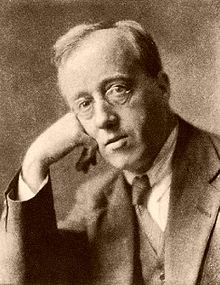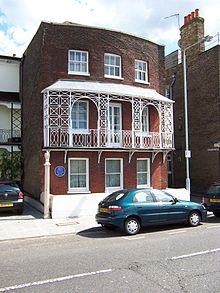- Gustav Holst
-
Gustav Theodore Holst (Aussprache: [həʊlst]; * 21. September 1874 in Cheltenham; † 25. Mai 1934 in London), geboren als Gustavus Theodore von Holst, war ein englischer Komponist lettisch-schwedischer – und weit entfernt auch spanischer – Abstammung. Er wird der Spätromantik zugerechnet.
Leben
Holst strebte zunächst eine Karriere als Pianist an; im Alter von 17 Jahren musste er diese Pläne aufgrund einer Nervenentzündung des Armes aufgeben. Später studierte er Komposition (bei Charles Villiers Stanford) sowie Posaune am Royal College of Music in London und arbeitete zwischen 1898 und 1903 in verschiedenen Orchestern als Posaunist. Anschließend war er an einigen Institutionen als Musiklehrer beschäftigt. Zwischen 1919 und 1923 lehrte er Komposition am Royal College of Music und der Universität in Reading. Er war eng befreundet mit Ralph Vaughan Williams.
Berühmt wurde Holst vor allem durch seine Orchestersuite The Planets (Die Planeten, 1914–1916).
Seine Tochter Imogen Holst war ebenfalls Komponistin und Dirigentin.
Werke (Auswahl)
Opern/Bühnenwerke
- Savitri (1916)
- The Perfect Fool (1918–1922/1923)
- At the Boar's Head (1924/1925)
- The Tale of the Wandering Scholar (1929)
Vokalwerke- Choral Hymns from the Rig Veda (1908-1912)
- The Hymn of Jesus für Chor und Orchester (1917)
- Chor-Ballett The Golden Goose (1926)
- Chor-Ballett The Morning of the Year (1927)
Orchesterwerke- The Mystic Trumpeter Opus 18 (1904)
- A Somerset Rhapsody (1907)
- Fugal Concerto für Flöte, Oboe und Streichorchester op. 40/2 (1923)
- Chorsymphonie op. 41 für Sopran,Chor und Orchester (1923/24)
- Doppelkonzert für 2 Violinen und Orchester op. 49 (1929)
- St. Paul's Suite (1913, mit dem Finale als Neuarrangement des 4. Satzes der Second Suite)
- Jig
- Ostinato
- Intermezzo
- Finale (The Dargason)
- The Planets (1914)
- Mars, the Bringer of War
- Venus, the Bringer of Peace
- Mercury, the Winged Messenger
- Jupiter, the Bringer of Jollity
- Saturn, the Bringer of Old Age
- Uranus, the Magician
- Neptune, the Mystic
- Lyric Movement (1933)
Für Blasorchester/ Military-Band- Three Folk Tunes (March on Three Folk Tunes), H106A (1905)
- First Suite for Military Band in Eb (1909)
- Chaconne
- Intermezzo
- March
- Second Suite for Military Band in F (1911)
- March: Morris Dance, Swansea Town, Claudy Banks
- Song Without Words "I'll Love my Love"
- Song of the Blacksmith
- Fantasia on the "Dargason"
- The Praise of King Olaf for Choir and Military Band (1910-11)
- A Moorside Suite (1928)
- Scherzo
- Nocturne
- March
- Fugue à la Gigue (Johan Sebastian Bach (BWV577), arr. Holst) (1928)
- Hammersmith Prelude and Scherzo, Op. 52 (1930)
- Prelude
- Scherzo
Weblinks
- Werke von und über Gustav Holst im Katalog der Deutschen Nationalbibliothek
- Holst Birthplace Museum
- Werkverzeichnis
- Gustav Holst
- Noten, Partituren und Auszüge zu Kompositionen von Gustav Holst im International Music Score Library Project
- Gustav Holst in der deutschen und englischen Version der Internet Movie Database
Kategorien:- Englischer Komponist
- Komponist (Romantik)
- Komponist (20. Jahrhundert)
- Komponist (Blasmusik)
- Geboren 1874
- Gestorben 1934
- Mann
Wikimedia Foundation.


